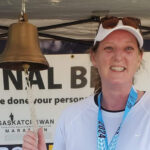When things got hard for Rhonda Thomas during a 50km run last summer, she thought of all the people who were having a tougher time than her.
“I started to think about those people who are homeless, those people who are struggling with food, those people who aren’t able to even run. So then I started thinking: I’m able to run, I’m able to run for these people. That gave me the strength to even go further and further and further.”
Now Thomas — a Cree woman from Pelican Lake First Nation who lives in Saskatoon — hopes many others will join her on a 50-kilometre run in March to raise funds for non-profit organizations in Saskatoon that support homeless populations as well as change mindsets of homeless individuals and about homelessness.
The race, which takes place on Sun. March 16, is called Ê-kwêskît, the Cree word for someone who changes their life around.
Ê-kwêskît is something Thomas understands intimately. The elementary school teacher once lived a life consumed by drugs and alcohol and just two years ago, those demons started creeping back into her life when she was going through a difficult time. She knew she needed to fight to stay sober — so when she saw a Facebook post that talked about how to balance the four aspects of the medicine wheel (the physical, intellectual, spiritual and emotional), she signed up for an online program that used physical challenges to help people grow in those areas.
“I’d been kind of running a little bit all my life, but here and there, not really consistent,” Thomas says. “I didn’t have the discipline. Two years ago when I started that program, I weighed 200 pounds. I could barely run a block or two blocks without just being winded.”
As the weeks and months passed, Thomas embarked on a number of fitness challenges, running and walking hundreds of steps a day. She lost 75 pounds and felt more comfortable in her body. In the spring of 2023, the man who runs the online program she joined — Denny Ledoux of Only Solutions — encouraged her to train to do a 42.2-kilometre run in honour of residential school survivors and all those suffering from mental health and addictions.
“About two weeks before the marathon, the creator came to me and said: Since you’re going to be running for the people, you might as well go out and see the people. So I started running in the community in Saskatoon, just running into the streets,” Thomas says. Her runs took her through west-side neighbourhoods where she saw many people experiencing homelessness. She would stop to talk and give them tobacco.
“They would say: ‘You smoke and you’re running?'” she recalls. “But in our culture, this is sacred. It is a prayer and a blessing. I said: ‘Put some of that tobacco in the water, say a prayer for yourself, and the creator will hear you.'”
A year after that marathon, Thomas challenged herself to go even further and did a 50-kilometre run in August 2024 to honour at-risk youth. She mapped out a route in Saskatoon that resembles the spokes of a medicine wheel. “The medicine well is a powerful symbol in our Cree culture,” she explains. “It represents all the people that are here on Earth, to unite people together.”
That medicine-wheel-inspired route, which starts at the Nutrien Wonderhub, is the same course Ê-kwêskît participants will tackle in March. Participants can opt to tackle the full 50 kilometres themselves, sign up for a team or register to run shorter 5-, 10- or 20-kilometre distances that will take them on one or more spokes of the medicine wheel. The evening after the race, all participants and their support teams are encouraged to attend a gala, which will feature a fashion show highlighting the work of Indigenous designers.
“The more people we have running at this event the more prayers we have for our homeless people,” Thomas says. “We want to show other people that it is possible and we can do it. If we come together as a community, I think we can do massive things. The more people we have out there, the more people our homeless people are going to see that actually care about them.”
Here’s what you need to know about the race:
What: Ê-kwêskît is a road race to raise funds for supporting homelessness populations in Saskatoon and change mindsets about homelessness. The full 50-kilometre route is designed to represent a medicine wheel. Participants can also sign up to tackle the distance as a team or run shorter 5-, 10- or 20-kilometre distances. Registration includes tickets to an evening gala, which includes dinner and a fashion show.
When: The race kicks off the morning of Sun. March 16. The gala takes place that evening.
Where: The race starts at the Nutrien Wunderhub with participants of the 50km race doing four out-and-backs north, south, east and west before doing a 10km loop between the Circle Drive North and Senator Sid Buckwold bridges.
How to register: Sign up online at iskotewwarrior.com/ekweskit. The cost for the 50-km distance is $100 for an individual or $150 for a team of five people. General admission for the gala is $30.









